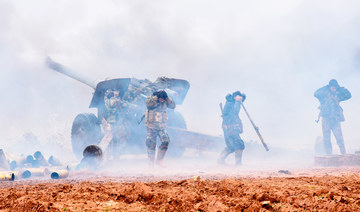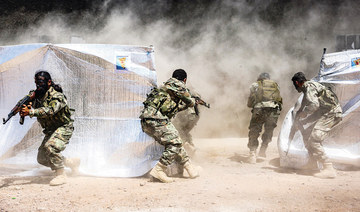LEEDS, UNITED KINGDOM: The New Year in Syria has brought no relief from the paralyzing stress of tighter Western sanctions, a fuel crisis that has persisted for eight years and a weak currency that plumbs new depths every month.
The Council of the European Union announced on May 17 its decision to extend restrictive measures against the Syrian regime and its allies until June 1, 2020.
The EU sanctions list, from which a few names and entities already targeted by a travel ban and an asset freeze have been dropped, currently includes 269 people and 69 entities.
The measures are aimed at punishing President Bashar Assad’s regime and protecting civilians, but they are also inflicting pain on ordinary Syrians and pushing them deeper into poverty; impeding humanitarian aid; making the procurement of medical supplies almost impossible; and killing all hope that Syrians might have had of a rapid improvement in their lives.
Basimah, a Damascus-based computer programmer, put it this way: “The EU and America said the sanctions were designed to spare civilians, but what we see on the ground is that only ordinary people are adversely affected by these measures.
“It is us who are freezing during winter due to fuel shortages, not the government.”
Ghalia M. Turki, a social activist and entrepreneur, believes “it is almost impossible to start an online business as the sanctions prevent Syrians inside the country from making online payments.”
She is the founder of two startups, Blaze Marketing Agency and Magma Academy, and her team struggles to collaborate remotely. “Important project management applications, such as Trello and Slack, are banned for both individuals and groups, making it difficult for teams to collaborate online,” she told Arab News.
“In addition, many websites that provide online courses and training have been banned, making it very difficult to access educational resources, especially with the poor Internet connection we have.
“The need to use VPN applications means even slower connections.”
Armand Cucciniello, a foreign policy expert and former US diplomat who advises the American military, believes that the situation will get worse in 2020 before its gets better.
“As we move into a new year, the security and humanitarian situations remain priorities for international observers of Syria,” he told Arab News.
“First, the country, along with Iraq, could continue to be the scene of a proxy war between the United States and Iran. The recent air strikes by the US on two facilities linked to Iranian-backed militias that are responsible for injuring American military personnel are illustrative of the security aspect.
“Second, IDPs, especially those fleeing Idlib, will need assistance as Syrian forces, with the support of Russia and Iran, continue to battle Al-Qaeda-linked groups there.
“Lastly, the EU’s extension of economic sanctions on Syria is where the security and humanitarian aspects to Syria merge. Sanctions, by definition, mean the country will continue to be isolated by the West, while the humanitarian crisis may worsen due to their effects.”
The fuel crisis and the sanctions, combined with the protests in Lebanon, have contributed to a deterioration in the Syrian currency’s value, which hit a record low earlier in December.
Before the start of the civil war, the Syrian currency was worth about 47 pounds to the US dollar. The currency has deteriorated steadily from the outset of the uprising in 2011, but the decline has accelerated since the economic crisis in Lebanon took a turn for the worse in mid-October last year.
On Dec. 2, the currency sank so sharply that the US dollar began to be sold for 950 pounds by the Central Bank and to fetch 1,000 pounds on the black market.
“Prices have been outrageously and continuously rising, but our salaries remain unchanged,” said Nadia K., 29, a Damascus-based marketing manager. “The prices of imported medicines are especially expensive.”

Ali M., 27, a Damascus-based accountant, told Arab News: “There are four employed adults in my family of six, and we could barely make ends meet before the recent rise in prices. Now, some of us need to start looking for second jobs to be able to put food on the table.”
The US imposed additional sanctions last year on Syrian officials, including Assad, on the basis of evidence provided by a former photographer in the Syrian military police who fled the country reportedly with photographs documenting the torture and execution of civilians incarcerated by the regime.
The 2014 Syrian detainee report, also known as the Caesar Report, purports to detail “the systematic killing of more than 11,000 detainees by the Syrian government in one region during the Syrian Civil War … from March 2011 to August 2013.”
On Dec. 22, US President Donald Trump signed the Caesar Syria Civilian Protection Act of 2019, approving additional sanctions on institutions and individuals doing business with the Syrian regime.
This act, which has been included as part of the National Defense Authorization Act of 2020, targets individuals as well as governments accused of providing “financial, material, or technological support to the governments of Syria, Russia, or Iran in reconstruction efforts, military activities, and/or petroleum and gas production.”
Syria’s oil production has suffered significantly since the war began in 2011. The country produced in 2010 about 400,000 barrels a day of crude and other petroleum liquids, according to figures published by the US Energy Information Administration (EIA).
FASTFACTS
24k - Syria currently produces 24,000 barrels of crude oil a day.
400k - Syria produced 400,000 barrels of crude a day in 2010, before the civil war.
$1 - The Syrian currency hit its lowest value since 2011 in early December, with 1,000 pounds fetching just one dollar on the black market.
Syria had 2.5 billion barrels of petroleum reserves as of January 1, 2011, according to an Oil and Gas Journal report, with the majority of these reserves concentrated in the east, near its border with Iraq and along the Euphrates River.
These days, the country produces 24,000 barrels of crude oil a day, according to figures cited by Mohammad Jeroudi, director of planning and international cooperation at the Syrian Ministry of Petroleum and Mineral Resources, in an interview with the Russian news agency Sputnik in October.
Jeroudi also said that the ministry has a strategic plan for 2030 for all fields and that Russia will contribute greatly to the implementation of these plans. Whether the plan can compensate for the shortfall caused by the loss of major oilfields in eastern Syria, including the largest, Al-Omar, in Deir Ezzor, is a different matter.
Despite the uncertainty over its future, Syria’s oil is drawing covetous looks from more than just the Assad regime. On Oct. 23 Trump said: “We have secured the (Syrian) oil and, therefore, a small number of US troops will remain in the area where they have the oil. And we are going to be protecting it, and we will be deciding what we are going to do with it in the future.”
A few days after that, he said: “We’re keeping the oil — remember that.” 
Michal Strahilevitz, associate professor of marketing at Saint Mary’s College of California and a behavioral economist, said that she was not surprised by the shifting focus of Trump’s interest in Syria, from fighting terrorism to securing oil, given his reputation as “a master at the game of spin.”
As the US heads into an election year, Trump’s main claim to being a successful president is what is happening with the economy, Strahilevitz said. “Actions that seem to be good for the wealth of the country fit with his efforts at having an image of being good for the economic well-being of the United States.”
The Syrian government is not counting on an oil bonanza as it seeks to revive a moribund economy. In an October interview with RT Arabic, Fadlallah Gharzeddine, assistant to the chairman of the Syrian Planning and International Cooperation Authority, claimed the 2020 budget, set at 4,000 billion Syrian pounds (about $9 billion), would create more than 83,000 jobs.
He provided a sector-wide breakdown of the allocations: 40 million Syrian pounds for the agricultural and industrial sectors; 50 million pounds for reconstruction; and 25 billion pounds for paying down public-sector debt to the General Organization for Social Insurance.
The optimism of Syrian officials, however, has little connection with the everyday lives of Syrian civilians as they face another bitter winter.
Asma, 32, a mother of two who is based in Damascus and who works in advertising, said: “I don't even want to think of my family’s future here. It frightens me. I believe the economic situation will continue to deteriorate.”
She added: “Winter has started, along with long hours of power outages. There is no heating fuel, no gas and no electricity.
“May God help us to survive yet another freezing winter during which nothing can keep us warm but layers of old clothes and blankets.”




























